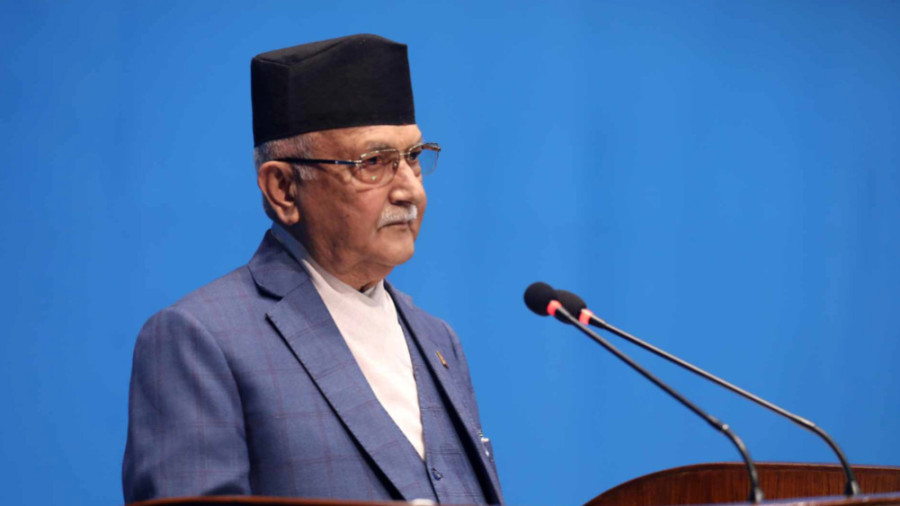Politics
Government of two largest parties has no excuse to fail: PM Oli
Oli fielded questions from lawmakers on a variety of issues including constitutional amendment, power trade and SPP.
Post Report
Prime Minister KP Sharma Oli has said that efforts are being made to incite people in the name of disenchantment towards the political parties.
Responding to questions from lawmakers during a House of Representatives meeting on Thursday, Prime Minister Oli said that those who do not like healthy competition between the political parties or those who are dissatisfied with the current political system are trying to stir up people against the political parties and create political unrest.
There have been efforts to make people more dissatisfied with the political system than they actually are, Prime Minister Oli said.
Addressing Parliament before Oli, Nepali Congress lawmaker Narayan Khadka had warned the government to be cautious about the use of social media.
“The current government is trying to instill hope in the people by taking everything into consideration,” Prime Minister Oli said in reply. “Positive results have started to appear in the short period of time since the formation of the government in my leadership and the current government has no excuse not to work. The government will work seriously to instill hope in the people.”
At least three lawmakers raised questions about constitutional amendment to the Prime Minister. While answering their questions, Prime Minister Oli said that constitutional amendment is not a matter of courage. “We will amend the constitution taking into account the experience of eight years of its implementation,” Oli said.
Meanwhile, lawmaker Narayani Sharma asked whether the current government formed with the objective of amending the constitution dares to revise the constitutional provision related to the electoral system and introduce the provision of a directly elected executive head.
“Amendment of the constitution is not a matter of courage,” Oli said. “The government won’t dare to amend the constitutional provision that does not need revision, but where it is needed, the government will not hesitate to show the courage.”
Likewise, Pashupati Shamsher Rana of Rastriya Prajantra Party also asked which of the articles of the constitution was the present coalition government of Nepali Congress and CPN-UML vying to amend.
“There is no definite article that the present government is aiming to amend as of now,” Oli answered. “It would be determined during the amendment process and it will be done based on the discussion with the lawmakers.”
Congress lawmaker Khadka had also put forth his queries related to constitution amendment.
The coalition government led by Oli was formed after the seven-point agreement between Nepali Congress and CPN-UML on July 1. With the agreement between two of the largest parties in the country, the Pushpa Kamal Dahal government, formed in support of UML on March 4, was unseated from the position on July 12.
One of the objectives the two parties came together to form the government is to amend the constitution, leaders have said.
During the quizz with the prime minister, CPN (Maoist Centre) lawmaker Purna Bahadur Gharti Magar raised the issue related to the State Partnership Program (SPP) and the recent visit of US Deputy Secretary of State Management and Resources Richard R Verma to Nepal.
Verma was on a two-day visit to Nepal, starting on August 16. Beside vowing to continue US support to Nepal in various sectors, Verma also informed the prime minister that the US intends to support $100 million in foreign military finance to support Nepal’s rotary wing capabilities.
“During the meeting with Verma, we discussed the multifaceted relations between two countries,” Oli said. “Verma said that the US will provide two helicopters to the Nepal Army. No issue related to SPP was discussed.”
Oli also claimed that most of the tasks relating to power trade with Bangladesh have already been concluded and there was a plan last month to sign the pact in the presence of the energy ministers of Nepal, India and Bangladesh.
The scheduled event was cancelled due to political unrest in Bangladesh.
The then Bangladeshi Prime Minister Sheikh Hasina resigned and fled the country on August 5 and Nobel laureate Mohammad Yunus became the interim prime minister of the country on August 8.
While answering the question of Congress lawmaker NP Saud, Prime Minister Oli noted that the agreement, which has been six years in the making since the energy cooperation between Nepal and Bangladesh was established, remained a top priority for the Nepali government.
“Given the recent developments in Bangladesh and the formation of an interim government there, the Ministry of Foreign Affairs and the Ministry of Energy, Water Resources, and Irrigation of Nepal are working to finalise the agreement as soon as possible,” Oli said.
Prime Minister Oli underscored the importance of the agreement, saying that it will mark a significant milestone in sub-regional energy cooperation in South Asia, as it will be the first time Nepal exports electricity to Bangladesh.
Moreover, Prime Minister Oli presented details as to how the government is working on a long-term plan to export 10,000 megawatts of electricity to India over the next decade.




 14.12°C Kathmandu
14.12°C Kathmandu













